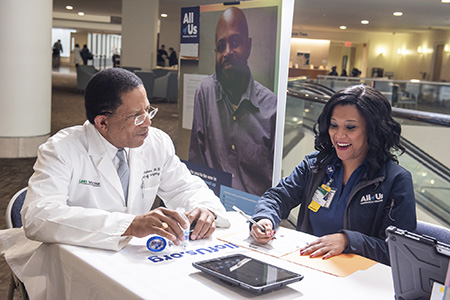
By Bob Shepard
UAB News
The All of Us Research Program at the National Institutes of Health has made strong progress in its efforts to advance precision medicine, according to a report published in the New England Journal of Medicine. The University of Alabama at Birmingham leads the Southern Network of All of Us.
With information provided by volunteers across the United States, All of Us is developing a robust data platform to support a wide range of health studies. The program aims to include data from 1 million or more people from diverse communities.
As of July 2019, more than 230,000 people have enrolled nationwide, including 175,000 participants who have completed the core protocol. Of those, 80 percent are from groups that have been historically underrepresented in biomedical research. Participants contribute information in a variety of ways, including surveys, electronic health records, physical measurements, Fitbit devices, and blood, urine and saliva samples.
“Researchers can use these data to better understand health and disease,” said Cora E. Lewis, M.D., chair of the Department of Epidemiology in the School of Public Health and co-PI of the Southern Network. “This could help identify risk factors for certain diseases, connect people to the right clinical studies, discover which treatments work best for different types of peoples and explore how technology can help people take better care of their health.”
In the future, the program will add new surveys and linkages to other data sets and digital health technologies, and begin genotyping and whole-genome sequencing participants’ biological samples. Data will be broadly accessible to approved researchers, and participants will receive information back about themselves.
“We are helping to build one of the largest databases of its kind for health research, one that will reflect the diversity of our region and nation,” said Bruce Korf, M.D., Ph.D., UAB’s chief genomics officer and co-PI of the Southern Network. “All of Us is using the most advanced informatics and genomics approaches available to accelerate discoveries to benefit people from all backgrounds. With the help of volunteers from Alabama, Mississippi and Louisiana, we are opening new doors in the prevention and treatment of a host of diseases, some of which have plagued our population for decades.”
The Southern All of Us Network has enrolled 12,545 participants to date from across the three-state region of Alabama, Mississippi and Louisiana. UAB, including its Birmingham, Huntsville, Montgomery and Huntsville campuses, has enrolled 8,294.
“Unique Research Opportunity”
“We are urging the people of our Southern region to take advantage of this unique research opportunity,” said Mona Fouad, M.D., director of the UAB Minority Health and Health Disparities Research Center. “This is a chance to directly affect research into diseases that disproportionately impact the South, especially in populations that are traditionally underrepresented in biomedical research. The people of Alabama, Mississippi and Louisiana have a real opportunity to create better health outcomes for generations to come, not just here, but all over the country. We want the program to reflect the rich diversity of the Deep South and to maximize our opportunity to make a positive difference in the future of health care.”
The program’s ongoing success will rely on several factors, according to the NEJM paper. The program must continue to enroll participants from across the country, including those in rural and other underserved areas. The program needs to ensure that participants, once enrolled, derive value, remain engaged and retain trust in the program such that they continue to share data in the long term. Additionally, the program must continue to protect from cyberattacks, protect participant privacy and harmonize data from different EHR systems. Work is underway on all these fronts.
The paper’s authors anticipate that the program’s value will become even more rich as it matures, enabling new discoveries over time. A goal of the study is to improve population health through the identification of risk factors and biomarkers, including environmental exposures, habits and social determinants, to allow more efficient and accurate diagnosis and screening, better understanding of diverse populations, more rational use of existing therapeutics, and the development of new treatments.
Alabamians age 19 or older, regardless of health status, are eligible to enroll in the program by visiting JoinAllofUs.org/UAB.



